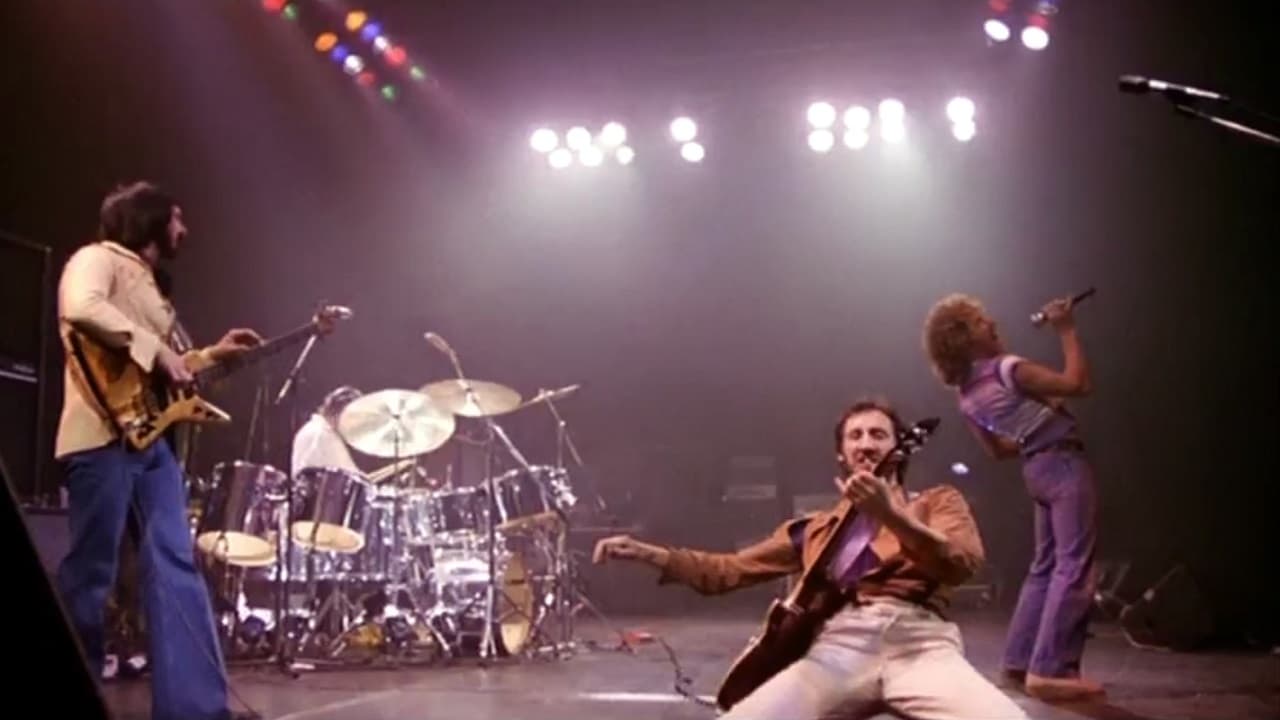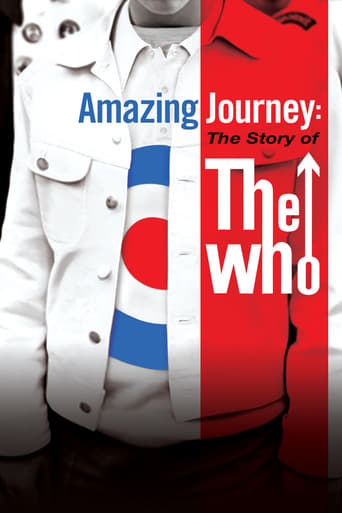Cinema_Fan
The major concern with history is that it tends to repeat itself. What we have seen already, with the 1979 Who biopic The Kids Are Alright and with other media outlets such as literature, film, television, the internet and of course word-of-mouth, for example, is that a pattern of over-saturation soon emerges, and in turn, the transparency of the whole exercise finally comes to its pinnacle.Adding the Who's latest addition "Amazing Journey: The Story of The Who" to its fold of historical repartee, at least, can only stretch the limits of rhetoric so far as to simply wonder what can be said that already has not been said. Murray Lerner, some years back, when researching this project, set up a website for the soul purpose of gaining untamed and fresh anecdotes and visual oddities from far and wide. Searching for an untapped source of Who experience to place in his, then, up-and-coming Who biopic.Here we have once more Messrs Daltrey and Townshend (drummer Moon died at the age of 32 in 1978 and bassist Entwistle passed away in 2002 aged 57) reminiscing on past accolades, adventures and just the sheer wonder of it all. With an interesting start, we see London's brunt-out and bombed streets that were World War II and the connection of an era of poverty and a monochrome childhood. All nostalgic and relevant as setting the seeds of attitude and rebellion to a world of trad-jazz in the wake of Count Basie, Duke Ellington, Sarah Vaughan and Frank Sinatra etc. All this feels relevant but the history lesson is only placed in a different perspective, and, we remain in the same zone, to fill the empty coffers of time that this historical event must dictate.This project, we should realise, is for the new audience, the new millennium, multimedia in-crowed of Who fans who have had the pleasure of their reformed concerts, their twenty-four hour, seven days a week internet broadcasts and their "MTV" appearances to headlining Europe's largest festival, during 2007, which is Glastonbury. New images not yet seen, mixed with old, and opinions not yet heard are brought together in a perpetual and wonderful montage spliced together to create an effective dossier of information already available in other formats, only here, we have special guest speakers, friends and family adding their thoughts and opinions.Youth culture picks up during the early sixties and we are introduced to the group's member's infatuation with the US' Blues and then the introduction of Keith Moon. Taking on a more verbally educational stance, this film is less visual montage, like its predecessor of 1979, and we are left in the room of these teachers' and their clips of nostalgia. A contemporary audience will find this riveting as too, no doubt, fans of a longer standing who know already of the line-up and name changes in their early career, as too, their affiliation of the English Mod youth sub-culture. Original footage of rioting, dancing and scooter riding gangs here are an asset to this documentary and adds a characteristic and texture like no other, this is a necessity to the heritage of both the Who and the swinging sixties. For a more realistic look into this lifestyle of sixties gang-culture, one should see the Who film, of 1979, Quadrophenia, based on and around the 1973 concept album of the same name. What has excelled this film more than anything else is the added footage, the rarely screened performance, of the band when known as The High Numbers during August of 1964 at London's The Railway Hotel; this is truly the diamond in the crown of this project and is worth watching for this reason alone.This film works well in the process of education and entertainment and looks at all aspects of their development, to the beginnings, to the destructive days of the sixties etc. What is questionable, is with all that has come and gone with Who media there are new statements and reasoning's that have never been heard. How much has never been spoken and how much is fabricated is subjective: filling the void with rock 'n roll rhetoric, perhaps? Respect goes out to their long, arduous work schedule throughout their long career, and nothing exemplifies this more than the Joe McMichael & 'Irish' Jack Lyons book "The Who Concert File", listing every show, gig and concert in the Who's entire lifespan. This way of life is too picked on by the film, but what is, and seems the norm, most curious is the missing archive footage of the managers Peter Meaden and Kit Lambert.Trying its best not to repeat the insights of The Kids Are Alright, it does regurgitate some already known historical facts, but it also stands very firmly as an individual on centre stage to perform, transcend and perpetuate the myth that is The Who. Paul Crowder and Murray Lerner have done an excellent job with the material given, and with skills combined, have now turned over the thirty-three and a third, and with this fresh, re-mixed approach, made a fitting epitaph to this epic, amazing journey that is The Who.
cordonr
I'm a huge fan of the who for only being 15. i stayed up until 3 o clock in the morning yesterday just to watch this film because i wanted to see it so bad. by the end of the film i was very pleased and i loved it! it was definitely worth staying up for and was not, i repeat, was not a movie just for the die hard fans as some would say. you don't have to like the who, know anything about music, or even have been born in that era to know that this movie was an absolute work of art. amazing journey was exciting, happy, and it was sad. but i guess thats the who's journey and it was true. i loved the way their story was told by the surviving members (pete and roger) along with some others. they told their story how it happened to them and how they remembered it. there were good times and there were bad times, but either way, the directors did an excellent job in helping to tell this amazing tale of the who's journey.....hats off.

